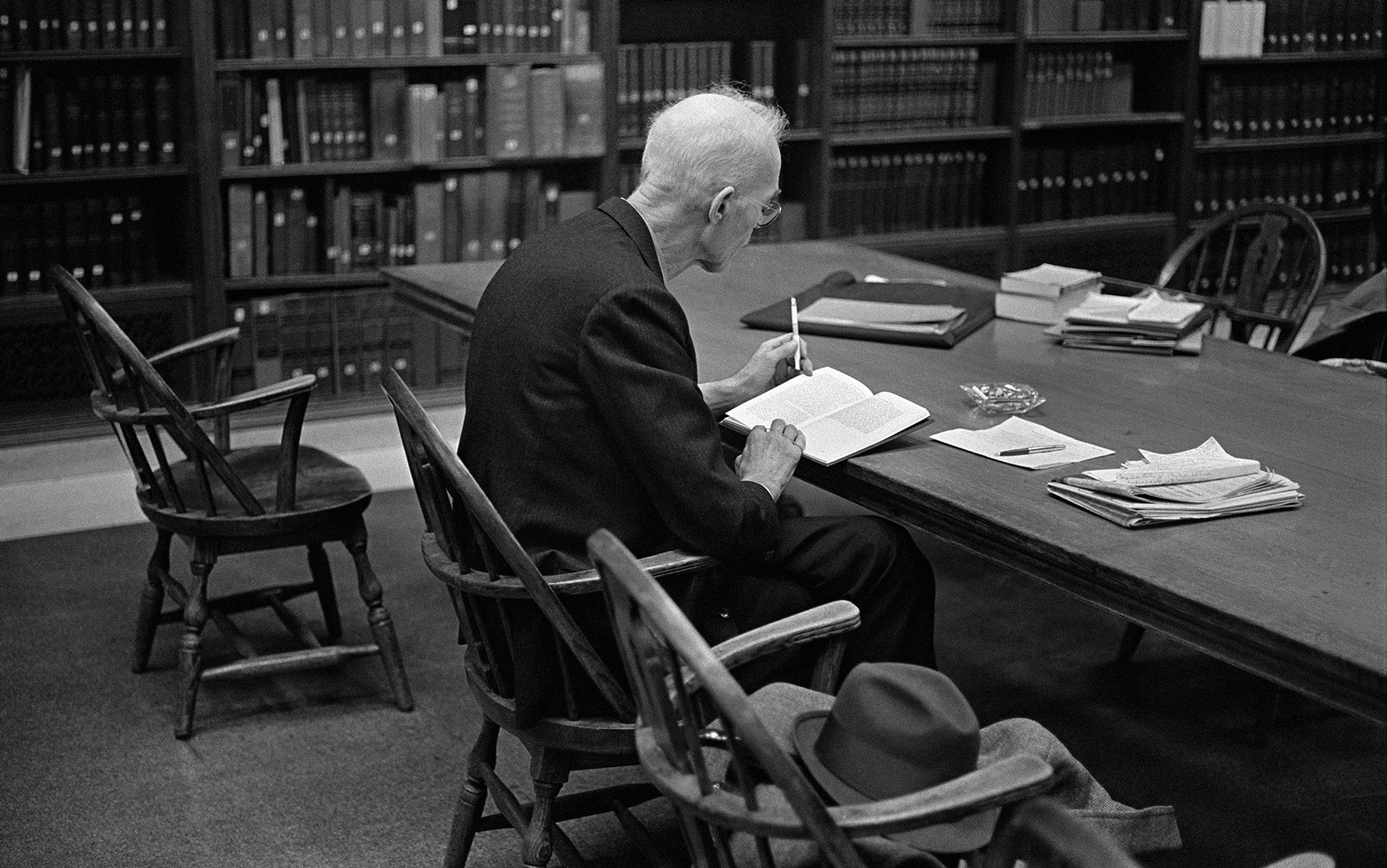In a democratic society, where, in theory, every citizen contributes to the process of deliberation – or at least to the choice of representatives who will deliberate on her behalf – it is hard to argue against improving the public understanding of philosophy. That is why Aristotle, the philosopher who in the 4th century BCE defined the mechanics of logic – the reasoning processes we use not only in all academic disciplines but in politics and other walks of everyday life – broke with the traditional exclusivity of philosophical circles.
Aristotle rejected the elitism of Plato’s Academy, where he had trained, and took to lecturing to the Athenian public every afternoon at the university he himself founded, the Lyceum. He also published short, accessible, inexpensive versions of his advanced treatises so that his ideas could circulate among the general population in the form of dialogues, or conversations between a philosopher and an ‘ordinary’ person. He called these shorter works ‘exoteric’, meaning ‘outward-facing’, the opposite of ‘esoteric’ or ‘inward-facing’, and used them to disseminate his findings in many different fields of knowledge.
Aristotle was one of the founding fathers not only of philosophy but of almost every branch of academic study – zoology and cosmology, aesthetics and rhetoric. His books on these topics are relatively dry and sometimes in arduous third-person prose, with sections of densely reasoned argument, but they have shaped the very form of academic writing used throughout history. They constitute one of the main reasons why philosophers, like all academics today, usually write formal prose books and papers rather than, for example, novels, plays or epic poems. Meanwhile, Aristotle’s exoteric public treatises – the ancient equivalent of open-access blogposts – did not survive the 23 centuries that lie between him and us. Fortunately, however, we can amass fascinating information about them from other classical literature.
Most people do not realise that Aristotle wrote works designed for the general public. If they did, then perhaps more philosophers would automatically assume that they needed to follow his example. In an ideal society, all research conducted at universities would routinely be made available to the public, enabling more people to join conversations about politics, society, culture and science in informed and instrumental ways. This would require wholesale reform of the economic infrastructure of academia – for example, wresting control of the dissemination of research from commercial publishers, and reducing the inflated cost of journal subscriptions. But the internet means that we now have an exciting opportunity to revive Aristotle’s commitment to public philosophy.
In William Shakespeare’s Henry IV Part 2, Falstaff begs his crony Pistol, who shows off by using elaborate language for the sake of it, to deliver his news ‘like a man of this world’. But Pistol could have made use of one of the four categories of reasons why some academics do not make efforts to explain their work clearly to people ‘of this world’. The first type of reason is pragmatic. If academics want to find a position in a university or secure tenure, then activities aimed at making their research available to the public, whether online or via ‘popular’ magazines and periodicals or broadcasting, are rarely taken into account when their professional performance is evaluated.
Secondly, writing solely for one’s immediate peers involves far less effort. As Arthur Schopenhauer put it, when frustrated by the obscurity of his forebear G W F Hegel’s writing: ‘Nothing is easier than to write so that no one can understand; just as, contrarily, nothing is more difficult than to express deep things in such a way that everyone must necessarily grasp them.’ Much academic writing is not deliberately impenetrable. It is impenetrable to a lay reader simply because the writer has tacitly avoided the extra effort required in expressing ‘deep things in such a way that everyone must necessarily grasp them’.
There is, however, a third type of reason why philosophical writing is often inaccessible, and it is that the author consciously intends it to be so. This was recognised by the scholars of Ancient Greece and Rome, and those of the Middle Ages, who commented on the treatises of Plato and Aristotle. These commentators criticised writing in which the intentional obscurity was designed to prevent readers from understanding or refuting it. They symbolised this sort of obscurantism with the cuttlefish, which discharges ink to cloud the water around it. But these commentators did accept that intentional obscurity can be commendable if it is designed to stimulate the reader to learn through grappling with the text.
Aristotle respected the ‘wisdom of the crowd’ and believed in a democratic ‘hive mind’
Later versions of this argument have been put forward by a whole series of thinkers, many of them in the tradition of continental philosophy associated with Hegel, whose abstruse style was criticised by Schopenhauer. Theodor Adorno defended obscurity in The Jargon of Authenticity (1964). He believed that our everyday language reinforces oppressive social systems. If, for example, we unquestioningly reproduce language that derides people for being lower-class, or that equates freedom with uncontrolled capitalist profiteering, Adorno thought that we collude in the verbal and cultural system that upholds social hierarchies and assumes that free markets are natural. In One-Dimensional Man (1964), Herbert Marcuse proposed that everyday speech perpetuated mindsets that prevent people from seeing beneath the surface of society to the invisible structures perpetuating the status quo. And in Monolingualism of the Other (1996), Jacques Derrida defended his own obscure style by saying that he wanted to liberate language from its domineering, colonial past in order to escape from the mentality of ‘the herd’.
Aristotle, however, would have found such thinkers’ attitudes to everyday language and the views of ‘the many’ patronising and overly dismissive. He respected the ‘wisdom of the crowd’ and believed in a democratic ‘hive mind’. He recommended launching any enquiry from endoxa, the beliefs commonly held by the majority, rather than assuming that they were too contaminated by historic usage and social prejudices to be useful.
Yet Aristotle’s surviving – and often difficult – treatises show that he would have supported the fourth type of argument in defence of a style of writing that might require effort from the lay reader to understand. Most of the extant Aristotelian works were written for his advanced students. Philosophy, thought Aristotle, was a skill or body of expertise like any other – a techne. He often equated it with the techne of medicine, or of harp-playing, or architecture. Any subject-area or techne needs to have its own items of vocabulary, which might not be in regular use among nonspecialists. If we want to insult this specialist vocabulary, we call it ‘jargon’ or ‘gobbledygook’. But we can also see it as a form of shorthand for complicated ideas. If I study car mechanics, there will be upwards of 100 terms I need to learn in order to communicate with my coworkers and ensure cars run safely. Similarly, in philosophy, there are concepts that a philosopher can take for granted her colleagues are familiar with, and that, when they are being debated in a seminar, need no explanation. But they do when they are taken beyond that environment.
Aristotle’s solution was to give two types of lecture, and write two types of treatise. One category was aimed at his students and colleagues, and one at the general public. Some academic disciplines these days are following Aristotle’s example (although they might not know it) as a matter of course. The Academy of Medical Sciences in the UK now advocates the appending of ‘lay summaries’ to all publications of biomedical and health research results and supplies advice on how to write them accessibly.
In about 500 CE, a philosopher called Ammonius of Alexandria described the difference between how Aristotle wrote for fellow philosophers and for the public. In his specialist treatises, his thought is ‘terse, compressed, and full of questions’; the language is quite dull, ‘owing to his search for precise truth and clearness’, and he ‘invents words if necessary’. But in the public, exoteric works, ‘which he has written for the many, he aims at a certain fullness, a careful choice of diction and metaphor, and modifies the style of his diction to suit the speakers, and in short does everything that can beautify his style.’
That insistence on being allowed to invent new language when talking to specialists is telling. If I am a car engineer and invent a new component, I will need to invent a new word to designate it. This will be swiftly adopted by my colleagues, but might well sound strange to an ‘ordinary’ person buying a car. Aristotle’s routine circulation of ideas in two published forms is a constructive policy for philosophers to imitate today.
It was addressed to a king, but was suitable for carrying around and reading while undertaking errands
Since Aristotle’s exoteric works were not transmitted to us from antiquity – because they were not copied out often enough by the learned Byzantine, Arabic and Medieval Latin scribes who studied them, we need to piece together a picture of how he wrote for the general public. His intended readers were the people he often mentions as all ‘the others’ (in addition to philosophers). We can appreciate from what we know about one lost exoteric work, probably entitled Nerinthus, the type of individual whom Aristotle envisaged as its reader. This was a Corinthian farmer, inspired by reading a treatise to give up viticulture in favour of studying philosophy full-time. In a pamphlet for the public called On Pleasure, Aristotle cracked a joke at the expense of otherworldly intellectuals who claimed to be experts on the Black Sea, which they had never visited, to crowds including business people who had recently returned from commercial trips to the Black Sea.
Aristotle’s dialogues for the public are also associated with the ‘ordinary working man’ in an anecdote about his most famous exoteric work, his Protrepticus, or Encouragement to Philosophy. The story concerns the philosopher Crates of Thebes, the teacher of Zeno, who founded the philosophical school called Stoicism:
Zeno said that Crates, as he sat in a shoemaker’s workshop, read aloud the Protrepticus, which Aristotle had written to Themison king of Cyprus, saying that no one had greater advantages for becoming a philosopher: he had great wealth, so that he could afford to spend money on philosophy, and had reputation as well. As he read, the shoemaker listened while he went on with his stitching, and Crates said: ‘I think, Philiscus, that I shall inscribe a Protrepticus to you; for I see you have more advantages for the study of philosophy than were his for whom Aristotle wrote.’
The Protrepticus might have been addressed to a king, but it was suitable for carrying around and reading while undertaking errands, and it was comprehensible to a cobbler. The skepticism that virtue and philosophical talent had anything to do with good birth is also expressed in a surviving excerpt from Aristotle’s exoteric On Good Birth: ‘The preference for it is a matter of opinion, and in truth there is no difference between the low-born and the well-born.’ By pointing out that a humble craftsman such as Philiscus might be better equipped to philosophise than King Themison, the anecdote also stresses the familiar Aristotelian theme that ‘intrinsic goods’ – moral qualities of character – are more valuable than external goods such as wealth and its trappings.
Aristotle himself appeared as a speaking figure in his Protrepticus, as Socrates appears in Plato’s dialogues. He proposed that philosophy was one of the best ways that non-philosophers could spend their recreation time. He made the rousing pronouncement that philosophical enquiry is desirable for its own sake rather than because it confers any financial advantage. He compares the contemplation of everything in the Universe, which is what philosophers do, to watching the competitions at the Olympic Games, or plays being performed at festivals. People don’t expect to get paid for watching these kinds of shows, ‘for the spectacle itself is worth more than much wealth’, even if it is not directly ‘useful’. If we want to watch athletes or actors, and learn from them, why would we not ‘think it right to view without payment the nature and reality of things?’
He also used the sort of riddling, tricksy argument that appeals to people just beginning to study philosophy, in arguing that we all philosophise all the time. Even to refute the existence or usefulness of philosophy requires using philosophical argumentation, ‘since even to enquire whether we ought to philosophise or not is to philosophise’, which is an activity ‘natural to man’. To illustrate how external appearances are a poor guide to true goods, which are intrinsic to the soul, Aristotle used the myth of Lynceus, the Argonaut gifted with the superpower of X-ray vision:
Strength, size, beauty are a laugh and nothing more, and beauty seems to be beauty only because we see nothing accurately. If one could have seen as clearly as they say Lynceus did, who saw through walls and trees, would one ever have thought any man endurable to look at, when one saw of what poor materials he is made?
Some of our best sources for the content of Aristotle’s works for the public are his own surviving, specialist books. His Poetics analyses in a technical way the constituents and effects of tragedy, and reads like lecture notes designed for a well-read academic audience. But he says that he has already published a book for the public discussing the mistakes that a playwright can make with the musical and visual dimensions of tragedy – that is, the most noticeable aspects of theatre. He made available to the public the reasons why he rejected Plato’s notion that there was a world of ‘ideas’ or ‘forms’, such as the ‘form of the good’, invisible to the naked eye, in favour of a philosophical system that began from the material world that we could perceive around us – perhaps the most fundamental difference between Plato and Aristotle. In the Eudemian Ethics he says that even ‘to assert the existence of a form not only of the good but of anything else is a mere idle abstraction, but this has been considered in various ways in both the exoteric works’ and the advanced treatises.
In a passage of the Nicomachean Ethics, Aristotle cross-refers to an exoteric work in which he has already ‘adequately’ discussed the nature of the soul. The implication is this: for a Lyceum student to understand a lecture delivered by Aristotle, he regards knowledge of previously circulated works a prerequisite. In his Politics, Aristotle tells us that he has already discussed in a public work ‘the principles concerning household management … that man is by nature a political animal; and so even when men have no need of assistance from each other they nonetheless desire to live together’. This material is covered in detail in book I of the Politics, but it looks as though Aristotle also published an accessible version of the same argument, fundamental to his entire system, about the household as the basis of the human community.
One of the longest fragments of an Aristotelian exoteric work comes from his influential Eudemus, or On the Soul. This dialogue was written to memorialise Aristotle’s friend Eudemus of Cyprus, to whom the Eudemian Ethics was also dedicated. Eudemus was a fellow alumnus of Plato’s Academy who died fighting in Sicily in about 354 BCE. One long fragment, which Plutarch says he is quoting verbatim, and which is therefore exceptionally precious, is preserved in the biographer’s consolatory letter to a bereaved man. It features a passage, in Aristotle’s own voice, in which he converses with a high-status listener. He introduces a fable that requires him to bring the satyr Silenus to life in the dialogue to discuss the famous proverb ‘Not to be born is best.’ The appeal to a well-known saying is consistent with Aristotle’s respect for endoxa, or popularly held beliefs, in his extant treatises.
Defuse the hostility against academics by ensuring that ideas circulate publicly in digestible form
Our reconstruction of Aristotle’s public philosophical dialogues has shown that he used them to communicate all branches of philosophy and that he was not afraid of addressing his most difficult ideas in them. All the evidence suggests that he saw the exoteric medium as of equivalent importance, a method of intellectual communication running parallel to his work with colleagues and students at the Lyceum, but packaged rather differently. What better model could there be for philosophers today, who might need to use advanced technical language, shorthand and the invention of new words to develop their ideas, but who could improve the clarity and precision of their thought by systematically making it available to a wider audience?
I do not believe that most academics are premeditated obscurantists whose goal is to exclude the uninitiated from their esoteric writing. Nor do I believe they deliberately want to alienate those whose capacity to read scholarly publications is restricted by their price-tags or by intolerance of mysterious metalanguage, bibliographical references and footnotes. There are long-term political, social and economic reasons why the academic industry has forgotten its primordial obligation to extend knowledge to others outside its own circle. But we can help to defuse the hostility against academic obscurantists, that anti-intellectual populists whip up, by ensuring that ideas circulate publicly in digestible form.
Aristotle’s example can assist us with this task. When he needed to express advanced ideas with maximum precision for his erudite colleagues, he freely adopted terse language, newly coined words and dense reasoning. But he also spent a considerable amount of time advocating the practice of philosophy by everyone, and explaining his central ideas in shorter works designed to circulate across the Greek-speaking world. In these, he made efforts to make philosophising attractive by the use of dialogue form involving colourful characterisation of the interlocutors as well as ornaments such as allusion to myth and fable.
This form won him high praise: Cicero spoke of the oratorical ‘river of gold’ that Aristotle’s popular dialogues poured forth. This implies that they worked splendidly in live delivery. Cicero also says that they included prefaces to entice the reader into opening the papyrus roll, like the blurb on a book today. They got straight to the point, without wordy preambles, and plunged immediately into the central argument. They were a treat to read, says Themistius in the 4th century CE, even by ‘the multitude’, since they were ‘full of light and translucent; their usefulness is not unmixed with enjoyment and pleasure.’
I am not proposing merely that philosophers adopt dialogue form in their written work. The digital age and YouTube have brought other fine new media for communication, although the short book or pamphlet in accessible prose, preferably opening with a version of the argument in an even shorter preface, still offers as much scope as it did when Crates read out Aristotle’s Protrepticus to that cobbler. It is important, too, that the Protrepticus, according to the Syrian philosopher Iamblichus in c300 CE, was encouraging to lay readers, reassuring them that intellectual labour could make everyone good citizens, and was not hard. Most inspiring of all, Aristotle’s motive in writing in two different forms was, ultimately, philanthropic: he did it, according to Elias, an Alexandrian commentator in the 6th century CE, simply because ‘he wished to benefit all mankind’.






